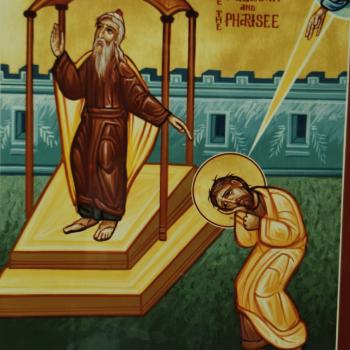Lectionary Reflections
Hosea 11:1-11
August 4, 2013
There can be little doubt that Hosea 11 is one of the more remarkable passages in all of the Hebrew Bible. Perhaps it is not surprising, coming from the haunted stylus of Hosea, that husband of a prostitute who spends his days worrying about a woman who refuses to abandon her trade; and though she has three children (whether or not any of them is in fact Hosea's is anyone's guess) she apparently takes little or no responsibility for their care. From this agonizing family situation Hosea teaches that YHWH feels about Israel just as Hosea feels about Gomer, namely, rejected, abandoned, and humiliated.
We spoke last time of the painful anti-feminist readings that this text has engendered, and I do not wish to overlook that wrenching reality. Still, it is perhaps true that only Hosea, spurned and jilted father and husband, who could reflect on the nature of YHWH in quite the radical way that he does in Chapter 11.
"When Israel was a young boy (usually thought to be one under the age of ten), I loved him; from Egypt I called my son. I called him (literal Hebrew "They called them"), but they left my presence. They sacrificed to the Baals, and offered incense to idols" (Hos. 11:1-2). Hosea first presents a summation of his understanding of the present state of the people of YHWH. YHWH freed them from the slavery of Egypt, the central claim of the action of YHWH (see Dt. 5 and Ex. 20) for the people. But instead of thanking YHWH with praise and right actions, Israel worshipped the Baals, sending up great clouds of incense to human-fashioned idols, to sacred poles and silver-festooned blocks of polished wood.
Now the Baals are formidable adversaries to YHWH. The Baals are immediate gods, represented by fertile fields, jars of olive oil, and succulent smells of bread and roasting meat. In the Spring, the cry "Baal Chaiie!" ("Baal is alive") rang through the mountains and hills of the villages of Israel, and many a YHWH worshipper joined in, attempting thereby to ensure a bounteous crop and a satisfied family. Though YHWH worship was demanded in the sacred places of that God, more than a few Israelites hedged their bets and serenaded Baal with fervency and frequency. After all, where was YHWH anyway? On some mountain somewhere, I suppose, but what has YHWH done for you recently? The Exodus was long ago, and Baal is current, relevant, offering his riches regularly. Yes, YHWH has a difficult antagonist in the Baal.
But Hosea is convinced that those things that Baal is believed by many to have done and to be doing for Israel have in fact been done by YHWH! "It was I who taught Ephraim (a euphemism for Israel, the northern kingdom) to walk; I lifted (the verb here is unclear) him into my arms, but they did not know that I healed them" (11:3). YHWH it was who trained the young Israel to walk in the right way. And when they fell and hurt themselves, it was YHWH who offered healing, not the non-existent Baal. Indeed, claims Hosea, whatever Baal is supposed to have done, YHWH was the real actor.
"I guided them with human cords, with belts of love. I was for them like those who loosen the yokes on their jaws; I then knelt down to them and fed them" (11:4). The extreme intimacy of these metaphors is not to be missed. YHWH is a parent, teaching Israel to take its first steps, picking them up in great divine arms, healing them when they fall. YHWH encircles them as they grow with cords and belts of protection, yet loosely applied so that Israel may easily eat the food YHWH offers. There are touch and taste and smell here as the divine parent plays the appropriate role and Israel grows up safely and protected. Yet, as 11:2 says, Israel rejected YHWH's teaching and loving, choosing instead the supposed succor of the Baals.
So, 11:5-7 presents God as rejected and spurned, and thus furious and vindictive, throwing Israel out of the land of promise, tossing them back to Egypt or handing them over to the power of Assyria (11:5). Instead of a time of peace, there will be war in the cities that devours the evil and lying priests and their disgusting schemes (11:6). This people continually "turns away from YHWH," and though they on occasion turn back around to call on the "Most High," YHWH refuses to answer, declines to raise them up from their war-torn fate" (11:7). Here Hosea sounds like his brother prophets: Israel has rebelled and God has come in destruction. That is what they may now expect from the God they have misused and brushed off.
But now for the surprise. "How can I give you up, Ephraim? How can I hand you over, Israel? How can I make you like Admah, treat you like Zeboim? My heart turns over against me; my comfort grows warmly tender" (11:8). The furious YHWH was given way to the plaintive YHWH. How richly these fickle folk deserve the back of YHWH's hand, but what they are about to receive is a complete change of the divine will and a thorough alteration of the divine emotion. No longer can YHWH reject the chosen people, because the YHWH who supposedly gives us what we deserve has been revealed rather as the YHWH whose overwhelming love and tenderness makes such behavior finally unimaginable. YHWH's "heart," the Hebrew seat of will and intelligence, quite literally "turns over" and speaks against the angry YHWH. And the "comfort" of YHWH (see Is. 40:1 for an emotional reiteration of this word for the exiles in Babylon), like the increasing glow of an oven, warms tenderly toward Israel. Admah and Zeboim are in the tradition of cities of the plain, connected with the annihilation of Sodom and Gemorrah.





